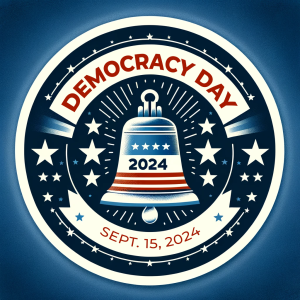This story is published as part of U.S. Democracy Day and the Utah College Media Collaborative, a cross-campus project bringing together emerging journalists from Salt Lake Community College, the University of Utah, Utah State University and Utah Tech University.
Founded on placing the power of governance in the people, democracy is an ongoing experiment dating back to ancient Athens. Today, the United States remains a leading example of this ongoing political experiment.
Fundamentally, the only requirement for democracy is vesting the power of decision-making to the people, whether directly or indirectly.
The U.S. applies this indirectly, allowing voters to elect government officials to represent them. The most extreme example of this is the upcoming presidential election.
While democracy has long remained on a pedestal in Western culture, it isn’t without flaws.
Any system that requires individuals to cast votes relies on the assumption that voters are educated on the topic of discussion. The fact that democracy cannot guarantee this assumption suggests an inherent flaw in the system of governance.
An individual’s voting power is rendered mute when it stems from a lack of civic education. Democracy fails when the public lacks the education to make informed decisions.
Education Inequality
There is a widening gap between the educated and non-educated subsets of the American populace. According to a 2020 study, this gap is present not only between income levels but also over party lines. Voters are 10% to 30% less likely to be aware of stories unfavorable to the political party they affiliate with.
Americans are not only uneducated on their country’s political affairs but also unaware of their ignorance. In a 2022 study, those who performed the worst on political tests also exhibited the most confidence in their political knowledge. In practice, this results in the less educated often being the loudest when politics are being discussed.
Education itself has a direct impact on election results. A phenomenon referred to as the diploma divide describes the shift of college-educated voters towards the Democratic party, with non-college voters aligning with the Republicans.
This isn’t to say being a liberal is the correct, educated position to take. However, it serves to reason there is a direct correlation between college education and voter turnout. Republicans cannot rely on voters who lack a civic education to win elections, sacrificing a necessary pillar of the democratic voting process.
It has been suggested that this is the result of college brainwashing. Assuming this is the case, the answer lies in changing the way education is approached, not avoiding higher education altogether.
The Role of the Media
Democracy is a longstanding tradition, yet only now has it begun to truly showcase the system’s shortcomings. This can be traced back to the funnel of misinformation that has plagued American media.
Digital news consumption has outpaced traditional news media, unleashing a new avenue for misinformation to spread. This becomes incredibly problematic when every major news site subscribes to a political bias.
A left-leaning voter cannot be considered more educated than their counterpart simply because they watch more CNN, and vice versa. Americans are held prisoner to whatever their main source of news is.
Fox News, a right-leaning news network, was forced to pay upwards of $785 million for spreading misinformation in 2023.
There are ways to protect oneself from misinformation, but they are time-consuming. Fact-checking every facet of political news one consumes is a luxury that most Americans do not have.
Presidential Campaigns
As November inches closer, voters have been subjected to Vice President Kamala Harris and former President Donald Trump’s campaigns. Unsurprisingly, both corners are littered with lies.
Harris has bounced back and forth between policies, leaving Democratic voters confused if she is the left-leaning candidate they were promised. President Joe Biden wasn’t known for his honesty either, often twisting the truth to support a specific narrative.
When Trump took the debate stage with Biden in June, his performance consisted of more lies than truth. Lies regarding increased taxes and post-birth abortions defined the debate that night.
Americans cannot trust their politicians to inform them of their own beliefs, let alone educate them on the state of the nation. As presidential candidates, they are the most responsible for conveying accurate information. Americans depend on them to be the most accessible outlet for information.
Slippery Slope
The discussion regarding voter eligibility has always fallen under scrutiny. After all, there is no true way to determine what defines an intelligent voter. Even if there were, voting is a fundamental right. This makes it difficult to pass legislation regarding the form of a test.
Blocking Americans from voting will never be the answer. Rather, steps must be taken to address the increasing education disparity limiting democracy.
Public education must be reformed to raise critical thinkers capable of weeding through obvious misinformation. The media and politicians must be held more accountable for knowingly spreading disinformation.
As it currently stands, democracy lies at the mercy of whoever controls and distributes information. Partisanship is much less indicative of personal values than it is of wherever one chooses to consume political news.
For democracy to be fully effective, the public must have access to accurate information.
If these criteria are not met, all that remains is a country that pretends to give its people decision-making power, while failing to represent the will of the people themselves.
Matthew Timpa reported and wrote this story as a journalism student with the University of Utah’s The Daily Utah Chronicle. His article is part of U.S. Democracy Day, a nationwide collaborative on Sept. 15, the International Day of Democracy, in which news organizations cover how democracy works and the threats it faces. To learn more, visit usdemocracyday.org.

m.timpa@dailyutahchronicle.com
The post Opinion: Democracy Dies Under Misinformation first appeared on The Daily Utah Chronicle.
